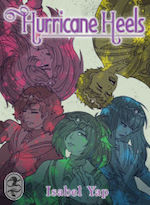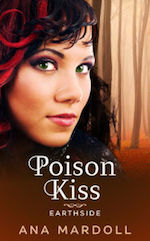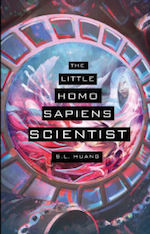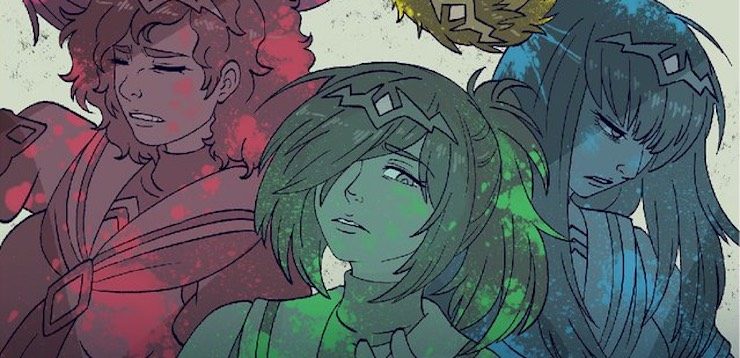Something happened in the tail end of 2016: I started saying I love you to my friends more often than I had before. There are a lot of things that feel both more precious and more fragile than they once did, to me, and friendship is one of those things.
That makes Isabel Yap’s Hurricane Heels (Book Smugglers Publishing, 2016) hit closer to home, and to hit more powerfully, than it might have otherwise. Hurricane Heels is—I want to call it a mosaic novel, since its constituent parts are so tightly knitted into a whole: a set of five linked novellas or novelettes that are, at heart, about the friendship and love and determination between five young women.
 Yap plays elegantly with the magical girl trope so often found in anime, but despite the playful irreverence and delight that infuses this work, there’s also an underlying seriousness. As we read the stories—told, in turn, from the point of view of each of the young women: Alex, Ria, Aiko, Natalie, and Selena—we come to realise that these young women are survivors, essentially child soldiers catapulted into a vast conflict that may never end, still fighting as adults.
Yap plays elegantly with the magical girl trope so often found in anime, but despite the playful irreverence and delight that infuses this work, there’s also an underlying seriousness. As we read the stories—told, in turn, from the point of view of each of the young women: Alex, Ria, Aiko, Natalie, and Selena—we come to realise that these young women are survivors, essentially child soldiers catapulted into a vast conflict that may never end, still fighting as adults.
They might not have known what they were choosing, as terrified thirteen-year-olds. But they keep choosing each other, as teenagers and as adults. They keep choosing to fight for each other, to protect each other, and to keep each other safe. And not just to fight for each other, but to fight for each others’ happiness.
This is the ode to friendship and love that I needed to read—with the added bonus of it also being an ode to kicking monsters in the face. Read it. Read it. Read Hurricane Heels. You won’t regret it.
I read the ebook, and as I said to a friend on Twitter: I want a paper copy, because I want to be able to PET IT AND HUG IT, YES.
 Ana Mardoll’s Poison Kiss and Survival Rout are also, in their way, odes to love and survival—though they are somewhat less stunningly successful than Hurricane Heels. Poison Kiss and Survivor Rout are perhaps best triangulated in terms of subgenre as “portal fantasy meets faerie-focused urban fantasy,” and while they use the same setting, they otherwise stand alone.
Ana Mardoll’s Poison Kiss and Survival Rout are also, in their way, odes to love and survival—though they are somewhat less stunningly successful than Hurricane Heels. Poison Kiss and Survivor Rout are perhaps best triangulated in terms of subgenre as “portal fantasy meets faerie-focused urban fantasy,” and while they use the same setting, they otherwise stand alone.
There are things I do not love about these novels. Mardoll’s protagonists are rendered amnesiac as a consequence of their experiences in the “otherworld,” and in Survival Rout, this absence of history renders the two viewpoint characters rather blander than is entirely to be preferred.
But Mardoll’s choice of first-person present-tense lends a vivid immediacy to proceedings, and despite its characterisation issues, Survival Rout (which I received as a review copy) nonetheless manages to sustain a claustrophobic intensity. I enjoyed it sufficiently well that I went straight out to acquire Mardoll’s earlier novel in the same setting, Poison Kiss. With its single viewpoint character—one who has a greater span of remembered personal history than Survival Rout‘s three—Poison Kiss is a smoother, more coherent read.
I’m not sure enough polyamorous romance—as opposed to poly erotica—exists for it to be a cohesive genre of its own (although I could be wrong). But Poison Kiss and Survival Rout both have a poly romance aspect to them. (Poison Kiss eventually involves a triad, Survival Rout a more complicated configuration of interested parties.) And they are both gloriously, unapologetically queer novels, with roles for people of many sexualities and genders, while also being realistically diverse in terms of race. They aren’t especially polished novels, but they’re solidly fun entertainment—more than worth a look.
 After three novels with happy forms of love, you might want a downer as a chaser. S.L. Huang’s The Little Homo Sapiens Scientist is an elegantly depressing science fiction novelette than retells the “Little Mermaid,” but with a human scientist joining the mermaids rather than the other way around. It’s extremely well done, and also about as dark as the abyssal depths of the ocean.
After three novels with happy forms of love, you might want a downer as a chaser. S.L. Huang’s The Little Homo Sapiens Scientist is an elegantly depressing science fiction novelette than retells the “Little Mermaid,” but with a human scientist joining the mermaids rather than the other way around. It’s extremely well done, and also about as dark as the abyssal depths of the ocean.
I’m going to go re-read Hurricane Heels, me.
Liz Bourke is a cranky queer person who reads books. She holds a Ph.D in Classics from Trinity College, Dublin. Find her at her blog. Or her Twitter. She supports the work of the Irish Refugee Council and the Abortion Rights Campaign.










